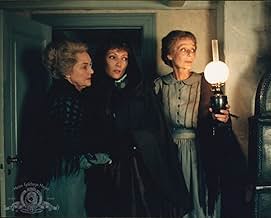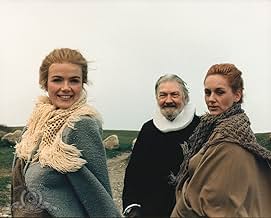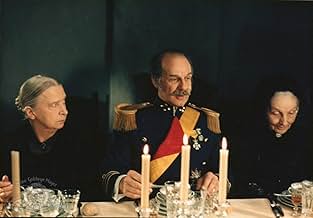NOTE IMDb
7,8/10
23 k
MA NOTE
À la fin du XIXe siècle, une communauté religieuse stricte dans un village danois accueille un réfugié français de la guerre franco-prussienne au service des filles du défunt pasteur.À la fin du XIXe siècle, une communauté religieuse stricte dans un village danois accueille un réfugié français de la guerre franco-prussienne au service des filles du défunt pasteur.À la fin du XIXe siècle, une communauté religieuse stricte dans un village danois accueille un réfugié français de la guerre franco-prussienne au service des filles du défunt pasteur.
- Réalisation
- Scénario
- Casting principal
- Récompensé par 1 Oscar
- 11 victoires et 8 nominations au total
Stéphane Audran
- Babette Hersant
- (as Stephane Audran)
Jean-Philippe Lafont
- Achille Papin
- (as Jean Philippe Lafont)
Ghita Nørby
- Narrator
- (voix)
Asta Esper Hagen Andersen
- Anna
- (as Asta Esper Andersen)
Avis à la une
This delicately told and moving story about the two devout daughters of a Danish Lutheran minister and their French servant is one of the finest European films of the 1980s. Set in a small, remote, austere Danish seaside town in the mid-19th century, the daughters devote their lives to continuing the work of their father in service of God, and in care for their needy townspeople. One of the daughters had turned down a promising opera career -- and the love of her French voice coach (a famous opera singer himself) -- to remain with her father and the town. Many years later the French singer sends a woman (Babette) -- who had lost her family in an outbreak of civil war -- to live with the sisters. She turns out to be an excellent cook, housekeeper and a shrewd shopper. The story culminates in a sumptuous feast prepared by Babette coinciding with a memorial to the reverend minister's 100th birthday. This delicious screenplay was adapted from the Isak Denisson (pen name for Karen Blixen) short story originally published in the Ladies Home Journal.
If you find the first 30 minutes of this film to be so slow that you wonder why you're watching it, don't give up. Also, hearing the Danish language is a bit new to most North Americans, who don't see and hear a lot of Danish films. Anyway, as the film progressed it got better and better and the viewer is rewarded for his/her patience.
Being a fan of the movie, "Out Of Africa," this film piqued my interest because it's based on a short novel by Isak Dinesen (Karen Blixen), the major character in that film.
The meal - Babette's feast - was amazing. I'm no chef, but I was impressed! How one interprets the story, too, varies, I suppose depending on how much you read into this, and where you stand religion-wise. If the latter, how you look at the definition of "legalism" can affect how you interpret this story.
In any case, it's a fine film, but don't watch this if you're dieting.
Being a fan of the movie, "Out Of Africa," this film piqued my interest because it's based on a short novel by Isak Dinesen (Karen Blixen), the major character in that film.
The meal - Babette's feast - was amazing. I'm no chef, but I was impressed! How one interprets the story, too, varies, I suppose depending on how much you read into this, and where you stand religion-wise. If the latter, how you look at the definition of "legalism" can affect how you interpret this story.
In any case, it's a fine film, but don't watch this if you're dieting.
The 1987 Oscar winner for Best Foreign Film is an austere but ultimately joyous fable set on a desolate spit of coastline in northern Denmark, where for sustenance the puritan townsfolk rely first on prayer and afterwards on their daily ration of a thin, brown gruel made from soggy bread crusts and dehydrated flounder. But all that changes with the arrival from Paris of an attractive refugee (the story takes place during the French Revolution) who thanks her benefactors, and tests their strict religious principles, by preparing a sinfully delicious gourmet feast for the entire town. The meal is more than enough to tempt even the most devout ascetic, but of course the dour villagers do their best to look as if they're not enjoying each luxurious mouthful. It's rare these days to find a film so unafraid of simple virtues, without even a trace of malice or cynicism to spoil its bittersweet charm. In the end the gap dividing the villagers' spiritual and earthly appetites is happily bridged, proving again that few things (except perhaps a good movie) are as life embracing as a hearty meal.
"Babette's Feast" proves that not all film theories and formulas are true 100% of the time. Here's a story where there is no life-or-death conflict, no raging anger, no violent outbursts. Nothing blowed up real good, and there is nothing resembling a chase scene. The conflict is about the ways in which people can be nice to each other. Their personal differences of passion or conviction are not as important as the ways in which they can connect with each other.
How shockingly refreshing.
There is an undercurrent to this film that gives it the feel of a Garrison Keillor monologue, in that it is built around people's personal foibles and quirks.
Even more refreshing is how "Babette's Feast" manages to be nice without becoming cloying, saccharine, facile, superficial or insincere. People's personal passions are portrayed not only from their own perspective, but from the perspective of the people they affect, with more realism than you usually get in film, yet also with sincere and infectious optimism.
If you don't come away from "Babette's Feast" smiling and feeling better, then you must have been distracted from giving it your full attention. This is one of those very rare films that you can recommend to everyone you know. It is truly in a class by itself. Like Mary Poppins, "Practically perfect in every way."
Utterly charming and subtly stunning.
How shockingly refreshing.
There is an undercurrent to this film that gives it the feel of a Garrison Keillor monologue, in that it is built around people's personal foibles and quirks.
Even more refreshing is how "Babette's Feast" manages to be nice without becoming cloying, saccharine, facile, superficial or insincere. People's personal passions are portrayed not only from their own perspective, but from the perspective of the people they affect, with more realism than you usually get in film, yet also with sincere and infectious optimism.
If you don't come away from "Babette's Feast" smiling and feeling better, then you must have been distracted from giving it your full attention. This is one of those very rare films that you can recommend to everyone you know. It is truly in a class by itself. Like Mary Poppins, "Practically perfect in every way."
Utterly charming and subtly stunning.
Flawlessly directed, written, performed, and filmed, this quiet and unpretentious Danish film is an example of cinema at its best, and if a person exists who can watch BABETTE'S FEAST without being touched at a very fundamental level, they are a person I do not care to know.
The story is quite simple. In the 1800s, two elderly maiden ladies (Birgitte Federspiel and Bodil Kjer) reside in remote Jutland, where they have sacrificed their lives, romantic possibilities, and personal happiness in order to continue their long-dead father's religious ministry to the small flock he served. One of the women's youthful admirers sends to them a Frenchwoman, Babette (Stéphane Audran), whose husband and son have been killed in France and who has fled her homeland lest she meet the same fate. Although they do not really require her services, the sisters engage her as maid and cook--and as the years pass her cleverness and tireless efforts on their behalf enables the aging congregation to remain together and the sisters to live in more comfort than they had imagined; indeed, the entire village admires and depends upon her.
One day, however, Babette receives a letter: she has won a lottery and is now, by village standards, a wealthy woman. Knowing that her new wealth will mean her return to France, the sisters grant her wish that she be allowed to prepare a truly French meal for them and the members of their tiny congregation. The meal and the evening it is served is indeed a night to remember--but not for reasons that might be expected, for Babette's feast proves to be food for both body and soul, and is ultimately her gift of love to the women who took her in and the villagers who have been so kind to her.
The film is extraordinary in every way, meticulous in detail yet not overpowering in its presentation of them. As the film progresses, we come to love the characters in both their simple devotion to God and their all-too-human frailties, and the scenes in which Babette prepares her feast and in which the meal is consumed are powerful, beautiful, and incredibly memorable. There have been several films that have used food as a metaphor for love, but none approach the simple artistry and beauty of BABETTE'S FEAST, which reminds us of all the good things about humanity and which proves food for both body and soul. Highly, highly recommended.
Gary F. Taylor, aka GFT, Amazon Reviewer
The story is quite simple. In the 1800s, two elderly maiden ladies (Birgitte Federspiel and Bodil Kjer) reside in remote Jutland, where they have sacrificed their lives, romantic possibilities, and personal happiness in order to continue their long-dead father's religious ministry to the small flock he served. One of the women's youthful admirers sends to them a Frenchwoman, Babette (Stéphane Audran), whose husband and son have been killed in France and who has fled her homeland lest she meet the same fate. Although they do not really require her services, the sisters engage her as maid and cook--and as the years pass her cleverness and tireless efforts on their behalf enables the aging congregation to remain together and the sisters to live in more comfort than they had imagined; indeed, the entire village admires and depends upon her.
One day, however, Babette receives a letter: she has won a lottery and is now, by village standards, a wealthy woman. Knowing that her new wealth will mean her return to France, the sisters grant her wish that she be allowed to prepare a truly French meal for them and the members of their tiny congregation. The meal and the evening it is served is indeed a night to remember--but not for reasons that might be expected, for Babette's feast proves to be food for both body and soul, and is ultimately her gift of love to the women who took her in and the villagers who have been so kind to her.
The film is extraordinary in every way, meticulous in detail yet not overpowering in its presentation of them. As the film progresses, we come to love the characters in both their simple devotion to God and their all-too-human frailties, and the scenes in which Babette prepares her feast and in which the meal is consumed are powerful, beautiful, and incredibly memorable. There have been several films that have used food as a metaphor for love, but none approach the simple artistry and beauty of BABETTE'S FEAST, which reminds us of all the good things about humanity and which proves food for both body and soul. Highly, highly recommended.
Gary F. Taylor, aka GFT, Amazon Reviewer
Le saviez-vous
- AnecdotesFirst Danish movie to win an Academy Award for best foreign language film.
- GaffesIn 1871 Babette pays with skilling, which was the currency used at that time; 14 years later, Babette still uses skilling, but Denmark changed the currency in 1875 from skilling to kroner and orer.
- ConnexionsEdited into Eventyret om dansk film 18: Nye perspektiver - 1970-1987 (1996)
- Bandes originalesWaltz No. 15 in A-flat major Op. 39
(arranged for orchestra) (uncredited)
Written by Johannes Brahms
Played during the dance hosted by the Royal family
Meilleurs choix
Connectez-vous pour évaluer et suivre la liste de favoris afin de recevoir des recommandations personnalisées
Détails
- Date de sortie
- Pays d’origine
- Langues
- Aussi connu sous le nom de
- El festín de Babette
- Lieux de tournage
- Sociétés de production
- Voir plus de crédits d'entreprise sur IMDbPro
Box-office
- Montant brut aux États-Unis et au Canada
- 4 398 938 $US
- Montant brut mondial
- 4 637 920 $US
- Durée1 heure 43 minutes
- Mixage
- Rapport de forme
- 1.66 : 1
Contribuer à cette page
Suggérer une modification ou ajouter du contenu manquant

Lacune principale
By what name was Le festin de Babette (1987) officially released in India in English?
Répondre






























